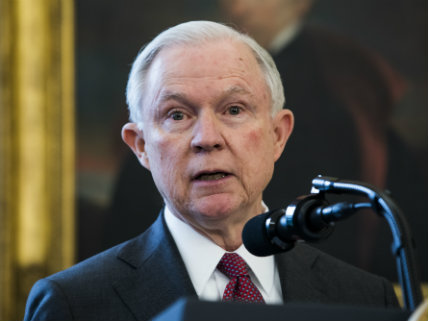Sessions Hasn't Read the DOJ Reports on Ferguson and Chicago Police
Sessions says the reports he didn't read on unconstitutional policing were "pretty anecdotal and not so scientifically based."


U.S. Attorney General Jeff Sessions told reporters Monday he has not read the Justice Department's scathing reports on unconstitutional policing in Chicago and Ferguson, Missouri prepared under the Obama administration.
"I have not read those reports, frankly," Sessions said in response to a question from The Huffington Post. "We've had summaries of them, and some of it was pretty anecdotal, and not so scientifically based."
Those reports, part of an aggressive push under the Obama administration to beef up the Justice Department's oversight of local police departments, found systematic civil rights violations, unconstitutional arrests, and excessive force by police. In Baltimore, police officers performed unconstitutional stops of pedestrians while Justice Department civil rights monitors were in the car with them. In Chicago, investigators found the police department did not even track gun discharges by officers that did not hit anyone.
If Sessions would care to familiarize himself with those reports, Reason has written several thorough summaries of what Justice Department investigators found. In Ferguson, the local police force essentially treated its poor and minority residents as a revenue stream, arresting them on petty and pointless charges, soaking them in court fees and fines, and then jailing them if they couldn't afford it.
As my colleague Ed Krayewski wrote: "The DOJ found significant racial disparities in arrests, citations, and other police action, but its findings about the pattern and practice of Constitutional violations by the FPD pointed to fundamental problems with the policing, and not just its racially-disparate application. Namely, the DOJ found systemic abuses of the First and Fourth Amendment rights of Ferguson residents by the police department, through unconstitutional stops, the use of excessive force, and treating protected conduct, like recording police or complaining about police conduct."
And in Chicago, Justice Department investigators found the department regularly failed to investigate potential witnesses of police misconduct, or in some cases intimidated and threatened witnesses who tried to come forward.
Nevertheless, Sessions has been a staunch defender of police amid calls for greater public accountability and reform following a string of high-profile shootings of unarmed black men over the past several years. "Sometimes local police departments really step up and do a great job and it's almost disrespectful of them for the feds to go in and try to take it over," Sessions said, according to Politico
Of course, it's also disrespectful and illegal for police to violate someone's constitutional rights, and even "anecdotal" violations matter quite a bit to the person whose rights are being violated.
The civil rights probes by the Justice Department laid the groundwork for a number of consent decrees between police departments, but Sessions said he hadn't made a decision on whether the Justice Department would pursue a similar agreement with Chicago.


Show Comments (49)